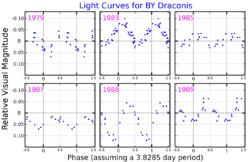Astronomy:BY Draconis
 Visual band light curves for BY Draconis from six different years, adapted from Pettersen et al. (1992)[1] | |
| Observation data Equinox J2000.0]] (ICRS) | |
|---|---|
| Constellation | Draco |
| Right ascension | 18h 33m 55.7728s[2] |
| Declination | +51° 43′ 08.905″[2] |
| Apparent magnitude (V) | 8.07[2] |
| Characteristics | |
| Spectral type | K6Ve[2] |
| U−B color index | +0.99[3] |
| B−V color index | +1.19[3] |
| Variable type | BY Dra + UV Cet[4] |
| Astrometry | |
| Radial velocity (Rv) | −25.484±0.046[5] km/s |
| Proper motion (μ) | RA: 185.759[2] mas/yr Dec.: −325.590[2] mas/yr |
| Parallax (π) | 60.59 ± 0.28[2] mas |
| Distance | 53.8 ± 0.2 ly (16.50 ± 0.08 pc) |
| Absolute magnitude (MV) | 7.48 / 8.63[6] |
| Orbit[5] | |
| Primary | BY Dra A |
| Companion | BY Dra B |
| Period (P) | 5.9751139 ± 0.0000046 d |
| Semi-major axis (a) | 4.4472 ± 0.0091 mas |
| Eccentricity (e) | 0.30014 ± 0.00062 |
| Inclination (i) | 154.41± 0.29° |
| Longitude of the node (Ω) | 152.3 ± 0.1° |
| Periastron epoch (T) | JD 2453999.2144 ± 0.0021 |
| Argument of periastron (ω) (secondary) | 230.33 ± 0.17° |
| Semi-amplitude (K1) (primary) | 28.394 ± 0.060 km/s |
| Semi-amplitude (K2) (secondary) | 32.284 ± 0.061 km/s |
| Details[5] | |
| BY Dra A | |
| Mass | 0.792 ± 0.026 M☉ |
| BY Dra B | |
| Mass | 0.697 ± 0.023 M☉ |
| Other designations | |
BY Dra, GJ 719, BD+51 2402, HD 234677, LTT 15477, SAO 31048, HIP 91009. | |
| Database references | |
| SIMBAD | BY Dra AB |
| BY Dra C | |
| ARICNS | data |
BY Draconis is a multiple star system in the constellation Draco, consisting of at least three components. Components A and B are main sequence stars,[5] and form a close binary star system with a short orbital period of only 5.98 days. Their individual spectroscopic classifications are dK5e and dK7e.[1] They form the prototype of a class of variable stars known as BY Draconis variables.[6]
The third component (C) is, by comparison, widely separated from the A-B pair by an angular distance of 17 arcseconds, which corresponds to 260 AU at the estimated distance of this star system—where an AU is the average distance from the Earth to the Sun. Component C is an M5 class red dwarf star. There may be a fourth component to the system, orbiting with a ≤1000‑day period, responsible for the eccentricity of the 5.98-day orbit, but this has not been visually confirmed.[5]
The variability of BY Draconis is caused by activity in the stellar photosphere called starspots, which are comparable to sunspots on the Sun, in combination with rapid rotation that changes the viewing angle of the activity relative to the observer. This variation has an average periodicity of 3.8285 days, but the brightness also changes over the course of several years—depending on the level of surface activity. Most observers believe that the primary star (A) is responsible for the variability as the secondary produces only a third of the total luminosity from the system. However, the spots may occur on both stars. Unlike the Sun, these spots may occur in the polar regions of the stars.[1]
References
- ↑ 1.0 1.1 1.2 Pettersen, B. R.; Olah, K.; Sandmann, W. H. (1992). "Longterm behaviour of starspots. II - A decade of new starspot photometry of BY Draconis and EV Lacertae". Astronomy and Astrophysics Supplement Series 96 (3): 497–504. Bibcode: 1992A&AS...96..497P.
- ↑ 2.0 2.1 2.2 2.3 2.4 2.5 2.6 "V* BY Dra". SIMBAD. Centre de données astronomiques de Strasbourg. http://simbad.u-strasbg.fr/simbad/sim-basic?Ident=V%2A+BY+Dra.
- ↑ 3.0 3.1 Epps, E. A. (1972). "UBV photoelectric observations. I. Stars within 25 parasecs of the Sun. II. Stars in quasar, galaxy fields. III. Stars in Kapteyn selected areas. IV. Miscellaneous stars". Royal Observatory Bulletin 176: 77–115. Bibcode: 1972RGOB..176..127E.
- ↑ Samus', N. N; Kazarovets, E. V; Durlevich, O. V; Kireeva, N. N; Pastukhova, E. N (2017). "General catalogue of variable stars: Version GCVS 5.1". Astronomy Reports 61 (1): 80. doi:10.1134/S1063772917010085. Bibcode: 2017ARep...61...80S.
- ↑ 5.0 5.1 5.2 5.3 5.4 Hełminiak, K.G. (2012). "New high-precision orbital and physical parameters of the double-lined low-mass spectroscopic binary BY Draconis". Monthly Notices of the Royal Astronomical Society 419 (2): 1285–1293. doi:10.1111/j.1365-2966.2011.19785.x. Bibcode: 2012MNRAS.419.1285H.
- ↑ 6.0 6.1 Boden, A. F.; Lane, B. F. (2001). "A Preliminary Visual Orbit of BY Draconis". The Astrophysical Journal 547 (2): 1071–1076. doi:10.1086/318394. Bibcode: 2001ApJ...547.1071B.
External links
- "BY Draconis star". The Internet Encyclopedia of Science. http://www.daviddarling.info/encyclopedia/B/BY_Draconis_star.html.
 |

